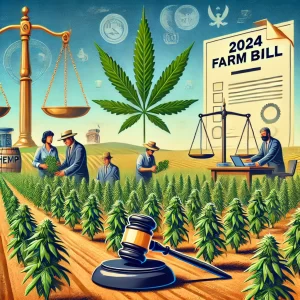
CLICK HERE FOR AN EASY WAY TO ENTER YOUR ADDRESS & AUTOMATICALLY CONTACT YOUR REPS
Understanding the Amendment
Mary Miller’s proposed amendment aims to impose stringent restrictions on the sale and distribution of hemp-derived THC (tetrahydrocannabinol) and CBD (cannabidiol) products. These restrictions include:
- Banning All Hemp THC Products: The amendment proposes to prohibit the sale of any products containing hemp-derived THC, regardless of concentration. This includes popular products such as delta-8 THC. This compound has gained significant popularity due to its similar effects to delta-9 THC found in marijuana but derived from legal hemp.
- Severe Restrictions on CBD Products: The amendment also seeks to impose strict limits on the concentration of CBD allowed in over-the-counter products. This could severely limit the availability of CBD oils, tinctures, edibles, and other wellness products. Consumers have come to rely on these for various health benefits.
- Increased Regulatory Oversight: Additional regulatory measures would be introduced. This includes more rigorous testing and certification requirements for hemp-derived products, which could potentially increase the cost of production and limit market access for smaller hemp businesses.
Impact on the Hemp Industry
The implications of this amendment are far-reaching and could potentially cripple the hemp industry. Here are some of the critical areas of impact:
Economic Consequences
The hemp industry has seen exponential growth since the passage of the 2018 Farm Bill. This legalized the cultivation and sale of hemp and its derivatives. According to industry estimates, the hemp market was valued at $4.6 billion in 2019 and was projected to continue its rapid growth. However, the proposed amendment could halt this progress, leading to significant economic losses. Small and medium-sized hemp farms and businesses, which make up a large portion of the industry, would be particularly hard hit.
Consumer Access and Health
Hemp-derived products, especially CBD, have become a staple for many consumers. Those seeking natural alternatives for pain relief, anxiety, sleep disorders, and other health issues have found relief from hemp. The proposed restrictions would limit consumer access to these beneficial products, forcing many to seek alternatives that may not be as effective or safe.
Legal and Regulatory Challenges
The amendment would introduce a host of new legal and regulatory challenges. Businesses would need to navigate a complex web of regulations, which could stifle innovation and discourage new entrants into the market. Moreover, the enforcement of such restrictions could overwhelm regulatory agencies, leading to inconsistent application and potential legal battles.
Industry and Public Response
The response from the hemp industry and the general public has been overwhelmingly negative. Industry stakeholders argue that the amendment undermines the progress made since the 2018 Farm Bill and ignores the economic and health benefits of hemp-derived products. Many are calling for a more balanced approach that considers the interests of all stakeholders.
Advocacy groups and industry associations are mobilizing to oppose the amendment. They are urging consumers, business owners, and policymakers to voice their concerns and advocate for the continued support of the hemp industry.
Act Now: Farm Bill Amendment
As the debate over the Farm Bill amendment continues, it is crucial for all stakeholders to engage in constructive dialogue. Policymakers must consider the broader implications of such drastic measures and seek solutions that balance regulatory concerns with the economic and health benefits of hemp products.
The future of the hemp industry hangs in the balance, and the outcome of this legislative battle will have lasting consequences. It is a pivotal moment for the industry. The decisions made in the coming months will shape the landscape for years to come.
In conclusion, Mary Miller’s proposed amendment to the Farm Bill represents a significant threat to the hemp industry. It is imperative for stakeholders to come together to advocate for a fair and balanced approach. This way, we can support the continued growth and innovation of this vital sector.








